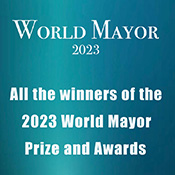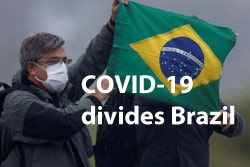
 |
CoronaVirus in Brazil’s states and cities By City Mayors Research * ON THIS PAGE: Brazil’s political authorities divided over right approach to COVID-19 ||| Countries with most reported COVID-19 cases ||| Political rivalries hinder fight against COVID-19 ||| Number of daily cases and deaths ||| More than 1,000 Brazilian cities face COVID-19 crisis ||| Research ||| |
|||||||||||||||||||||||||||||||||||||||||||||||||||||||||||||||||||||||||||||||||||||||||||||||||||||||||||||||||||||||||||||||||||||||||||||||||||||||||||||||||||||||||||||||||||||||||||||||||||||||||||||||||||||||
FRONT PAGE About us   ON OTHER PAGES US cities and Covid-19: Seven pages of research & tables US mayors support universal basic income Mayors fighting Covid-19 COVID-19 divides Brazil COVID-19 hits African Americans hardest CoronaVirus comparison: Nations and major cities COVID-19 cases in London and Berlin: A four-week comparison Mayors fighting the CoronaVirus COVID-19 The strengths and weaknesses of US cities during a pandemic |
 Brazil’s political authorities divided Brazil’s political authorities dividedover right approach to COVID-19 22 May 2020: A little over month after Brazilian President Jair Bolsonaro described the CoronaVirus pandemic as a “little flu”, the country recorded more than 310,000 cases of COVID-19 infections and some 20,000 related deaths. Since Brazil carries out fewer tests than many other countries, the true numbers of infections and deaths are thought to be considerably higher. Brazil has now more known CoronaVirus cases than Italy, Spain and the UK and only ranks behind the US and Russia. Hardest hit are the states and cities in the north and northeast of the country as well as big metropolitan areas like São Paulo and Rio de Janeiro. During the first three weeks of May 2020, the daily numbers of new infections and deaths have been on a steep upward curve. Countries with most reported CoronaVirus cases (22 May 2020)
Political rivalries hinder fight against COVID-19 Brazil’s response to the CoronaVirus pandemic has been dogged by political infighting. Infighting within President Jair Bolsonaro’s own government – two health ministers have resigned in the past six weeks – and rivalry between, city mayors, state governors and the federal President. Jair Bolsonaro favours a laissez-faire approach to dealing with the epidemic, claiming that a strict lockdown would severely damage the economy. But the majority of state governors and many city mayors have urged their citizens to pay no heed to the President and stay at home. Faced with overwhelmed hospitals and surging CoronaVirus deaths, Brazilian state and local governments are moving towards mandatory lockdowns against the will of the President, who says job losses are more damaging than COVID-19. On Sunday, 17 May, the Mayor of São Paulo told reporters that the medical infrastructure of Brazil’s largest city was on the verge of collapse. “Public hospitals have reached 90 per cent of capacity and there is a strong likelihood they will run out of space within the next two weeks,” Bruno Covas said. In Manaus, the capital city of Amazonas, Mayor Arthur Virgilio Neto announced ten days ago that five times as many burials were taking place than normal. Like many other cities, Manaus has set up makeshift field hospitals to care for the ill. Still, many sick people did not dare come to the overcrowded facilities for help. The number of Brazilians dying at home has jumped by 20 per cent since March. In the state of Amazonas that number is more than 2.5 times higher than average. One of President Bolsonaro's most outspoken opponents has been Joao Doria, the governor of São Paulo state. Although he supported Bolsonaro in the last election, he recently said we have two viruses to combat, the CoronaVirus and the Bolsonaro virus. “This is not the moment for politics, it is the moment to protect people." As the leader of Brazil's most populous and economically powerful state, Joao Doria is thought of as a challenger to Bolsonaro in the 2022 presidential election, The Governor has taken an entirely different approach to dealing with the virus than has the President. "Doria has introduced strict social-distancing measures, pointing to international practices and scientific advice. He is doing so to distinguish himself from other governors and position himself against Bolsonaro," Guilherme Casaroes a fellow of the Fundacao Getulio Vargas think tank explained. But despite recognising the severity of the CoronaVirus crisis, few states or cities have introduces mandatory restrictions. Social-distancing rules and curfews have yet to be imposed in São Paulo. Only a few cities, such as Fortaleza in the north-eastern state of Ceara, or the port city of Recife in Pernambuco on the Atlantic coast, have begun implementing such rules. Rio de Janeiro Mayor Marcelo Crivella prohibited non-residents from entering 11 neighbourhoods and ordered the closure of all businesses except supermarkets and pharmacies in some of the city’s favelas. Rio de Janeiro State Governor Wilson Witzel has decreed non-binding quarantine recommendations and commerce restrictions until the end of May. He pledged to make police available so the state’s 92 mayors can enact lockdowns, but stopped short of imposing them himself. Many scientists believe that the real number of infections is much higher than those given in official statistics. A 40-member team of researchers from the University of São Paulo Medical School say that based on their scientific models the true number of infections could be at least 16 times higher than official figures suggest. According to the model, some 2.1 million Brazilians may have been infected by 9 May, a total higher than that in the US. Brazil’s former Health Minister Luiz Henrique Mandetta, who last month was forced to resign by President Bolsonaro, admitted that the real number of infections was far higher than those published by his own ministry. On 15 May, Brazil lost its second health minister in a month after President Bolsonaro demanded wider use of unproven anti-malarial drugs to fight the CoronaVirus outbreak. The President had demanded that Minister Nelson Teich issue federal guidelines for the early use of hydroxychloroquine to treat infected patients, despite studies that cast doubt on the effectiveness of the malaria drug for COVID-19 and even raised concerns it may cause heart problems. Number of daily new CoronaVirus cases and related deaths in Brazil
More than 1,000 Brazilian cities face COVID-19 crisis More than 1,000 Brazilian cities have reported outbreaks of COVID-19 infections. The epicentres are in the north and northeast of the country as well as in the metropolitan areas of Rio de Janeiro and Sao Paulo. States like Bahia, Minas Gerais or Parana have so far been largely spared. While the State of Amazonas, bordering onto Peru, Colombia and Venezuela, reported almost 18,500 cases and more than 1,300 related deaths, Minas Gerais, with a considerably larger population has had only 4,200 cases of COVID-19, with less than 150 deaths. The largest number of infections - close to 59,000 – occurred in São Paulo, although only 29 per cent of the state’s urban conurbation reported any outbreaks. States where more than 50 per cent of cities have announced cases of CoronaVirus include Amapá, Para and Amazonas in the north of Brazil, as well as Rio de Janeiro. In three states in the centre of the country – Golás, Mato Grosso and Mato Grosso do Sul – more than 90 per cent of towns and cities have so far not had any outbreaks. Brazilian cities reporting CoronaVirus outbreaks
An index devised by the Votorantim Institute found that the Brazilian municipalities most vulnerable to COVID-19 are concentrated in the North and Northeast of the country. Mojuí dos Campos, in Pará, has the worst situation, followed by Wanderley and Ibirataia, both in Bahia. According to the research, Colina, in upstate São Paulo, is the cityåååååå least vulnerable to the virus. Other resilient municipalities inclue São Bernardo do Campo (São Paulo) and Nova Li,a (Minas Gerais). The research took account of factors such: Vulnerable population: Local economy, Structure of the health system; Organisation of the health system and Fiscal capacity of the municipality. * Research sources: Ministério da Saúde (Federal Ministry of Health); Johns Hopkins University (USA); Fundacao Getulio Vargas Institute; University of São Paulo Medical School; Brasil.io; Oswaldo Cruz Foundation; Votorantim Institute; State and city websites and press announcements © Copyright: City Mayors. All rights reserved Follow @City_Mayors |